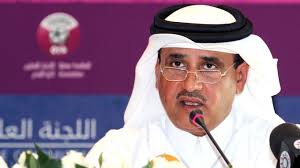By Andrew Warshaw
April 7 – Saoud Al-Mohannadi, the Qatari official controversially disqualified at the last moment from standing as an Asian member of FIFA’s ruling Council, has won a landmark appeal that could have far-reaching consequences in the region as well as raise questions over the supposedly independent decision-making process of FIFA’s ethics watchdogs.
In a rare defeat for FIFA’s ethics apparatus, which has seen plenty of sanctions reduced but hardly any overturned, FIFA’s appeals body has ruled that Al-Mohannadi was wrongly barred for one year last November for allegedly failing to cooperate with a previous, unspecified ethics investigation.
The case of Al-Mohannadi, a vice-president of the Asian Football Confederation (AFC) and of the Qatari FA, emerged in September, just days before AFC members were due to elect delegates to represent them on FIFA’s ruling Council
When Al-Mohannadi’s candidacy was blocked (he was barred from standing while the matter was investigated), the AFC postponed the ballot in protest, dramatically calling off its extraordinary Congress in Goa after just 27 minutes.
At the heart of the protest was the feeling within the AFC member associations that FIFA was using its Ethics department as a political tool to secure the election of officials to the FIFA Council who were sympathetic to the views FIFA president Gianni Infantino.
The delayed Asian elections – with eight candidates vying for four places – were rescheduled for May 8 in Bahrain, three days ahead of FIFA’s annual congress.
But significantly, Al-Mohannadi is not on the new candidate list because he remained banned when the entry deadline passed in January and the burning question now is whether the AFC somehow finds a way of parachuting him back into contention.
The answer is surely negative now that nominations have closed, a scenario that seems likely to infuriate the AFC administration and cause further divisions between the region and the FIFA hierarchy led by Infantino.
FIFA appeal judges also lifted Al-Mohannadi’s $19,900 fine, ruling that “the evidence available was not sufficient” to establish that he had violated the code of ethics.
FIFA have never given any details of the specific investigation that Al-Mohannadi supposedly failed to cooperate with though it is known it did not concern the 2022 World Cup awarded to Qatar.
It is understood his case was handled not by FIFA’s chief investigator Cornel Borbely but by his number two Djimrabaye Bourngar whose department originally recommended a two and a half-year minimum sanction. The fact that this was cut by more than half by ethics judges was already a strong indication of the flimsiness of the case.
The ruling that originally banned Al-Mohannadi mentioned failure to co-operate in “the proceedings against a third party”, but didn’t say who that third party was. Sources have long indicated it was someone already under investigation by the FIFA Ethics bodies – and now we know for definite.
The day before the Al-Mohannadi ruling, FIFA’s adjudicatory chamber announced formal proceedings against Najeeb Chirakal, a former aide to disgraced ex-Asian football chief Mohamed bin Hammam. A few weeks ago Chirakal was banned for life for breaching eight different articles of the FIFA code of ethics including bribery and corruption, offering gifts, conflicts of interest and failing to cooperate with investigators.
FIFA didn’t mention his name when it released the appeal committee’s ruling in Al-Mohannadi’s favour on Thursday but Insideworldfootball has seen a copy of documentation which confirms that Chirakal was indeed the third party at the heart of the case.
The documentation, summing up why the appeals committee overturned al-Mohannadi’s ban, says there was “no motive to lie and mislead” FIFA investigators and that there was insufficient evidence “to support the finding that Mr Al-Mohannadi provided incomplete statements” regarding Chirakal’s status.
However, the summary also made the point that there was “no indication of political motivation” by those who investigated the case.
Contact the writer of this story at moc.l1713946086labto1713946086ofdlr1713946086owedi1713946086sni@w1713946086ahsra1713946086w.wer1713946086dna1713946086


